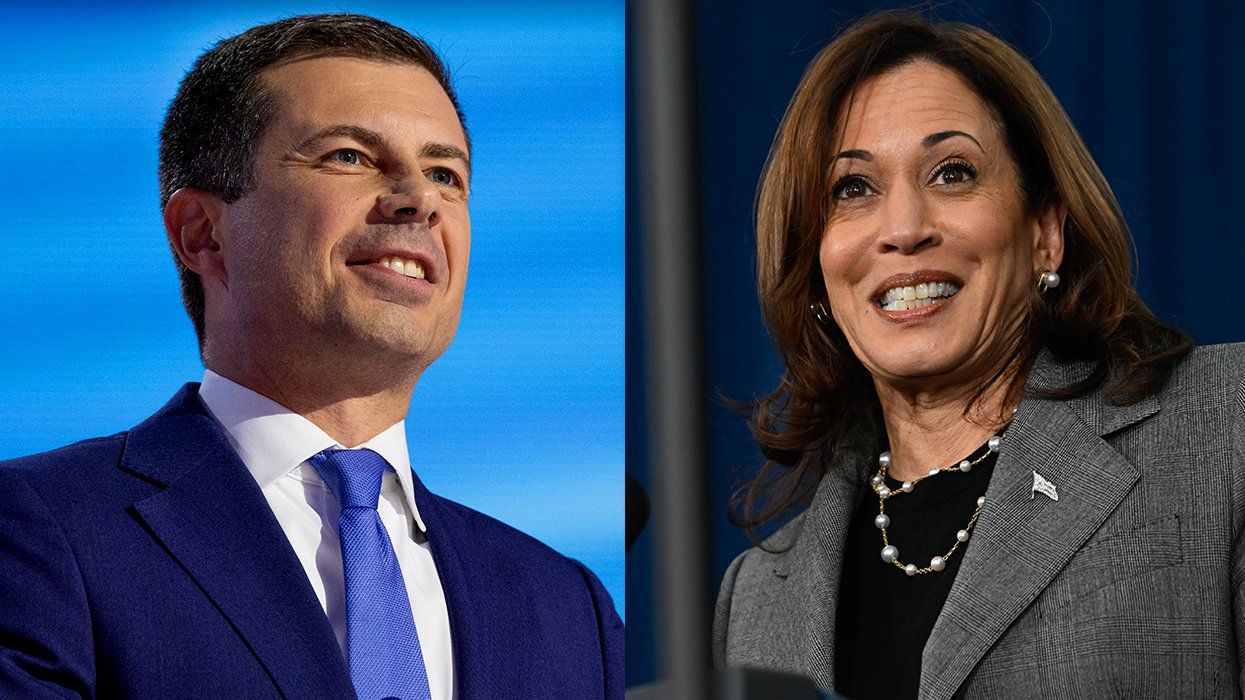Former Transportation Secretary Pete Buttigieg has pulled ahead in the early contest for the 2028 Democratic presidential nomination, edging out other high-profile names in a party still searching for its next standard-bearer, according to a new national survey.
Keep up with the latest in LGBTQ+ news and politics. Sign up for The Advocate's email newsletter.
A June Emerson College Polling survey, published on Friday, finds Buttigieg, who is gay, leading the Democratic field with support from 16 percent of likely primary voters. Former Vice President Kamala Harris, who once dominated early polling, has slipped to 13 percent, followed closely by California Gov. Gavin Newsom at 12 percent.
Pennsylvania Gov. Josh Shapiro and New York U.S. Rep. Alexandria Ocasio-Cortez each earn 7 percent, while Vermont Sen. Bernie Sanders captures 5 percent and New Jersey Sen. Cory Booker 3 percent. Nearly one in four Democratic voters, 23 percent, remain undecided.
Related: Pete Buttigieg reportedly won’t run for U.S. Senate, keeping 2028 presidential hopes alive
The results mark a dramatic change from November, when an earlier Emerson poll taken after the election showed Harris with 37 percent support, far outpacing her rivals.
Buttigieg’s emergence reflects not just his credentials as a cabinet official and former presidential candidate, but also his ability to bridge policy expertise and cultural fluency —a combination increasingly vital in a fragmented political landscape. His recent appearances on podcasts such as Flagrant, where he discussed fatherhood, racial identity, military service, and the emotional costs of political life, highlight a strategy of engaging younger and culturally attuned audiences.
He has also been vocal in moments of national crisis. In June, Buttigieg condemned the Trump administration after federal agents violently detained California Sen. Alex Padilla during a press conference in Los Angeles. Padilla, the first Latino U.S. senator from California, was handcuffed and forced to the ground after attempting to question Homeland Security Secretary Kristi Noem.
Related: Why Pete Buttigieg said ‘no’ to Michigan’s open political races
Earlier this year, Buttigieg declined to run for Michigan’s U.S. Senate or gubernatorial seats, citing his desire to spend more time with his husband, Chasten, and their kids, Penelope and Gus, at home in Traverse City. Considered one of the most effective communicators among Democrats, many in political circles believe Buttigieg is positioning himself for a presidential run.
Although President Donald Trump cannot run again, he has floated the idea of a third term (something barred by the Constitution). On the Republican side, Vice President JD Vance has solidified his standing as the early favorite for the 2028 nomination, earning 46 percent support among GOP primary voters. Secretary of State Marco Rubio polls at 12 percent, Florida Gov. Ron DeSantis at 9 percent, and Health and Human Services Secretary Robert F. Kennedy Jr. registers 5 percent. Vance’s support has grown markedly since November, when he held 30 percent of the vote.
Related: Democrats eye Pete Buttigieg for potential run for Michigan governor
The overall 2028 race remains tight. In a generic presidential ballot, voters are evenly divided, with 42 percent backing a Democratic candidate and 42 percent favoring a Republican, while 16 percent remain undecided. Among independents, Democrats hold a slim edge, leading 37 percent to 29 percent, although a significant 34 percent remain undecided.
Voters continue to cite the economy as the most important issue, with 32 percent naming it, followed by threats to democracy at 22 percent and immigration at 14 percent.
















Charlie Kirk DID say stoning gay people was the 'perfect law' — and these other heinous quotes
These are some of his worst comments about LGBTQ+ people made by Charlie Kirk.